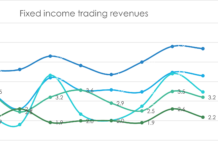US market regulator, the Securities and Exchange Commission (SEC), has proposed regulation of high-frequency trading (HFT) firms, also referred to as proprietary trading firms (PTFs), in order to “more consistently” apply to firms engaged in similar activities the “important protections to investors and the markets that result from registration and regulation under the Exchange Act, including those obligations that promote market stability.”
In a statement, SEC chair Gary Gensler, said, “Additionally, in recent years, we’ve seen a number of high-profile events in markets with significant participation by PTFs. Tremors in the Treasuries markets in 2014, 2019, and at the beginning of the COVID crisis in 2020 demonstrate the importance of the SEC’s oversight of dealers, consistent with the statute.”
As reported by The DESK, the SEC has not investigated multiple possible causes for these events, although it has acknowledged and reported on them. Examples include elevated levels of self trading by HFT firms during the 2014 event, and JP Morgan’s spoofing activity in the Treasury market over this period, for which it was fined by the SEC. Regulatory reports into these events have deliberately not drawn conclusions about possible causes, for example noting of the 2014 event, “Because analysis is ongoing and the data are an incomplete snapshot of the US interest rate complex, the findings presented are necessarily preliminary and limited in scope.”
In 2017 The US Treasury recommended that HFT firms be identified in TRACE data. The new proposal draws upon the SEC’s original ’34 Act authorities, including the authority added in the 1986 statute.
Gensler said, “It would help ensure the SEC has oversight over PTFs and others engaged important liquidity-providing roles, such as market making. Specifically, today’s release proposes further defining a dealer and government securities dealer as one that engages “in a routine pattern of buying and selling securities that has the effect of providing liquidity to other market participants” by, for example:
• “Routinely making roughly comparable purchases and sales of the same or substantially similar securities in a day; or
• Routinely expressing trading interests that are at or near the best available prices on both sides of the market and that are communicated and represented in a way that makes them accessible to other market participants; or
• Earning revenue primarily from capturing bid-ask spreads, by buying at the bid and selling at the offer, or from capturing any incentives offered by trading venues to liquidity-supplying trading interests.”
With respect to the US Treasury market, the proposal will include a quantitative measure, which would require actors with at least US$25 billion of trading volume in government securities in at least four of the previous six calendar months to register with the Commission.
The proposed rule further says it should not be presumed that certain persons are not dealers solely because they do not meet the standards of the rules. Other patterns of buying and selling may have the effect of providing liquidity to other market participants or otherwise require a person to register under otherwise applicable precedent. The proposed rules will also not be applied to a registered investment company or to a “person that has or controls total assets of less than US$50 million.”
©Markets Media Europe 2025













